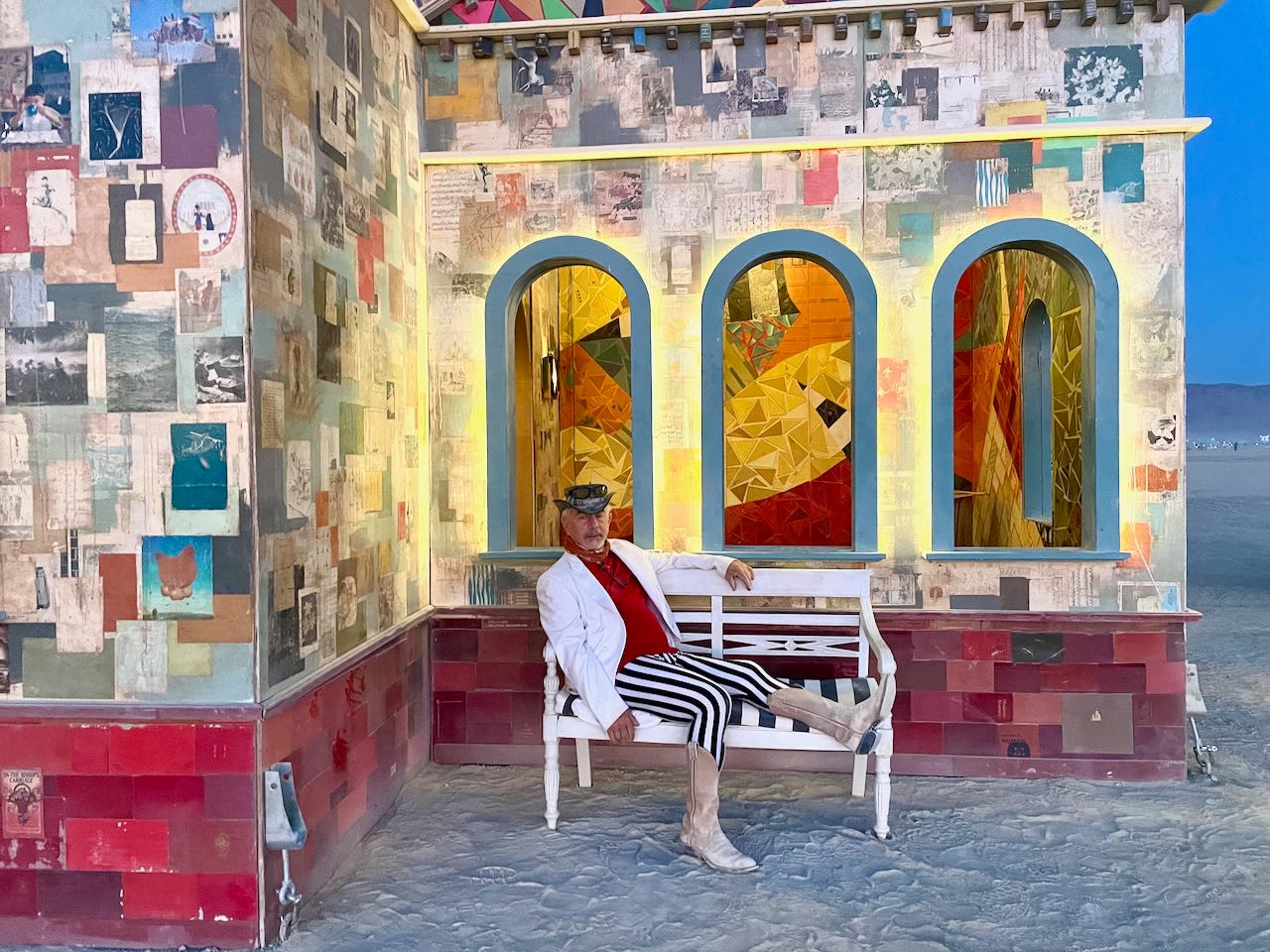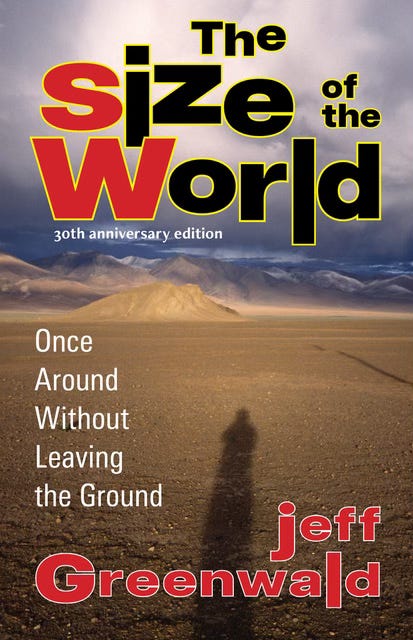It's a beautiful summer day and I'm planted in an Adirondack chair, tucked into a willow’s shade on a Forestville patio: A spontaneous visit with my friends David and Jules Nelson-Gal, two artists and builders who I met during last year's kaleidoscope project for Burning Man. Both David and Jules also joined last November's Himalayan Writers Workshop; Dave loved it so much he’s joining us again this year.
The photos in this week's metaphorically named dispatch are views of the installation Jules created on the Playa in 2022. The name of the artwork was Unbound. In her words:
“Unbound is a project created by artist Jules and Dave along with numerous friends, artists, builders, engineers, writers and readers. It is a library — a temple to human thought, altered by time, space and energy and collaged with over 3,000 deconstructed books, infusing the piece with a 'debris field of human thought.’ ”
Unbound was a nearly life-size tribute to the classical libraries of old, complete with columns, pediments and arched windows. Its wooden substructure is covered entirely with recycled book covers, spines and pages. This arresting work of genius was easily one of the most beautiful things on the Black Rock desert the summer of 2022.



On the drive to Sonoma last night I was listening to one of my favorite podcasts: Pivot, with Kara Swisher and (usually) Scott Galloway. But Galloway takes August off, and Kara’s guest for this episode was the writer and psychologist Mel Robbins, talking about her current bestseller, Let Them. A few things Mel and Kara spoke about seemed to loosen my own shackles, and I want to share my thoughts about that in this particular post.
“Let Them theory is a very simple concept.” Robbins said.” It is a philosophy that's all about control and power. What is in your control; what is not in your control. And the fact is that most of us spend way too much of our time and energy burning through things that are beyond our control. “
One of the main things that is completely out of our control,” she continues, “is other people: what they think, what they do, what they say, how they feel, what they believe. We have a fundamental need to feel in control. It's a survival mechanism that's not going away.”
Instead of running ourselves ragged trying to curate the behavior of others, Robbins suggests we fall back on two words: “Let them. Let them feel what they're gonna feel, and do what they’re gonna do. Because you cannot control another human being.”
The second part of “Let Them” theory is reminding ourselves that, at any given moment, there are only three things we can control: “what we think, what we do, and how we respond to the feelings that arise. That's all you've got,” Robbins states. (And yes, this is almost identical to wisdom traditions such as Buddhism, Stoicism and logotherapy.)


Robbins references Dr. Ramani Durvasula, an American clinical psychologist and author. As Durvasula puts it, “Wishing somebody else is different is the source of your suffering in a relationship.”
“Lots of us will feel that wave of grief and disappointment because a person can't be who we want them to be and who we maybe deserve to have them be.”
This stopped me in my tracks (not literally, as I was driving). In a flash of insight I realized how all of this might apply to my own primary relationship: the one with Parkinson's. The suffering, grief, and disappointment are real — and I also know that I cannot change this partner. It’s like a matrimonial vow, old school Catholic style.
“But what you do with it is what matters more — because that's where your power is.”
At the end of the day — however long that day might be — this partner is the one I'm going to be buried with. Meanwhile I can continue to train my thinking, and taking each moment as it comes. I can do my best to stave off the condition’s advance by biking and hiking, writing, communing with my friends, timing my meds right and getting enough sleep.
As for the feelings that arise, well that's a complicated one. Arising feelings are at the core of the human condition. For me (as with everyone else contending with their mortality) the most important thing is to recognize which feelings reflect the complicated reality of my life, and which bind me in a net of discontent. Like any meditation practice, it takes self-discipline — and I’m pretty good at that.
"I am not sure that I exist, actually.” Wrote Jorge Luis Borges. “I am all the writers that I have read, all the people that I have met, all the women that I have loved; all the cities I have visited."
Unbound has a lot going on. Its beauty and complexity really do evoke what Jules called “a temple to human thought.” Though I never got to explore the interior, I can imagine that, in a Borgesian way, a visitor would inevitably encounter a book title —on an unbound page, cover or spine — that perfectly reflected various instants of their lives-in-progress.
Paradoxically, these infinite connections offer an untangling from the tyranny of our mortal selves. For now, in the present moment, this dude abides in the center of this web. For me, this knowledge offers a kind of freedom. Parkinson's will be my life partner from this moment forward. It will do what it does. Let it. And so will I.
Okay, in the Good News Department: My “new” book is out! It’s available to for purchase on order from bookstores, or on two platforms. You can now order The Size of the World through either IngramSpark or Amazon. Amazon also features a Kindle version. This revamped 30th Anniversary Edition is a beauty, and includes a Foreword by Don George, a new Introduction by me, a map, and various odd surprises. It makes a great gift for anyone inspired by wanderlust!
Thanks again for reading, I hope you enjoyed this post. A quick note: beginning with my next column, only paid subscribers (at any level) will be able to access the archives of my (35 and counting) Big World entries, or contribute to the Comments section. Please do consider becoming a paid subscriber — it’s a mark of respect for what I’m up to with this work.







Amazing pictures from Unbound! I read Robbins’ book and it has stayed with me. As for Parkinson’s, if you haven’t listened to the Movers and Shakers podcast out of London, I can highly recommend it!
Glad to arch up on the ongoing physical battle, main thing is you are still fighting, griping and growling about fate’s uncertain prospects. Longterm prospects on this end are pointing toward oblivion. Which I’ve witnessed before watching my father-in-law’s slow exit. Keep griping! It’s healthy. I’m cheering the Grasping Orange-faced Toad’s daily blunders!